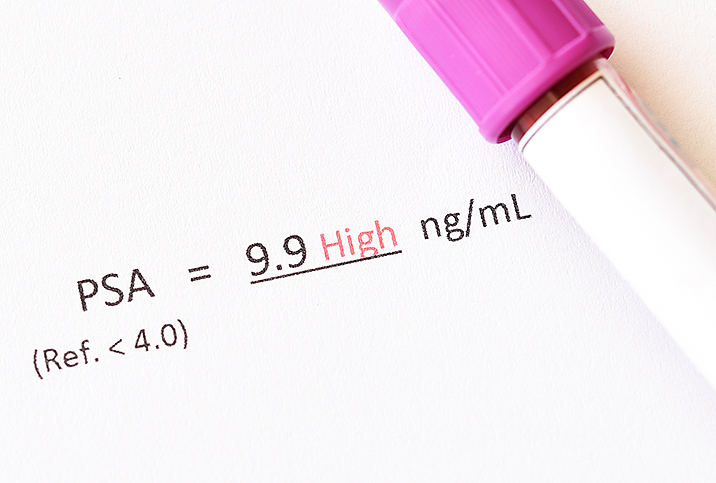What Are the Potential Outcomes of an Elevated PSA Test?

A common prostate cancer screening method is a blood test that measures prostate-specific antigen (PSA), which is a protein made by the prostate gland.
PSA is in your body at all times, though levels can rise if there is a problem with your prostate. One potential problem is prostate cancer, which is why an elevated PSA test is worrying. Fortunately, it often doesn't mean cancer.
Common misconceptions about elevated PSA
"Many think elevated PSA is synonymous with having prostate cancer; this is not true," said S. Adam Ramin, M.D., a urologic surgeon and the medical director of Urology Cancer Specialists in Los Angeles. "While about 25 percent of men with elevated PSA will have prostate cancer, 75 percent will not."
The PSA blood test itself is not a disease-specific test—it doesn't screen for only prostate cancer—and elevated levels do not necessarily indicate a problem, according to Ramin.
"Patients with elevated PSA often ask, 'How can I lower my PSA?'" he said. "The answer is that while it is possible to bring PSA down, this approach may be actually detrimental."
He added that certain medications for an enlarged prostate (benign prostatic hyperplasia or BPH) can artificially lower PSA to 50 percent of its true level.
"If the PSA elevation is due to cancer and we artificially lower it, then the cancer may not get diagnosed in time," he explained. "Therefore, it is better to treat the possible underlying condition that leads to the rise in PSA rather than artificially reducing it."
Why might you have an elevated PSA level?
"A high result doesn't automatically point to cancer," Ramin reiterated.
He said a man's PSA blood test result could be elevated for a number of reasons, including:
- Prostate cancer
- An enlarged prostate
- Prostate infection
- Other types of infection in the body, such as gastroenteritis, flu, urinary tract infection or a cold
In addition, some individuals have naturally higher levels than others, which is why establishing a baseline number is important. Age plays a role in "normal" PSA levels, too. According to Johns Hopkins Medicine, a normal PSA level for men in their 40s and 50s is 2.4 nanograms per milliliter (ng/mL). For men in their 60s, anything above 4 ng/mL is considered abnormal.
Managing prostate size is a smart thing to do even without the prospect of an elevated PSA test. The prostate gland grows throughout a man's life, so stopping enlargement entirely isn't likely. Lifestyle and diet choices can help. In some cases, so can supplements, especially one that combines three prostate-friendly herbs in one capsule. Prostate Health vitamins from Giddy Health utilize saw palmetto, stinging nettle and pygeum in a formulation intended to help manage prostate size and maintain a healthy urinary flow. And its microbead technology ensures a timed release throughout the day.
Other benign reasons for PSA elevation include recent ejaculation and any pressure in the perineum—the area between the anus and the scrotum—such as recently having ridden a bicycle or a horse, according to Justin Houman, M.D., a reproductive urologist and men's health specialist at Tower Urology in Los Angeles and the medical director for Bastion Health, an app-based telehealth platform for men.
What are the next steps if you have elevated PSA?
Houman advised if your PSA test result comes back elevated, the first step is to recheck it to see if the elevation was caused by a one-time benign reason. The second test can happen anywhere from six to eight weeks later.
It's important to assess the factors listed above.
The next course of action depends on how suspicious your doctor is about the presence of cancer versus other possibilities. For example, Ramin said if you have recently recovered from the flu, COVID-19, a cold or gastroenteritis, your doctor may recommend repeating the PSA test in a few weeks. Or if you have symptoms of prostatitis—burning with urination, perineal pain, urination urgency or suprapubic pain—they may want to treat it with antibiotics and then repeat the PSA test.
No one-size-fits-all solution exists for a person with an elevated PSA level. Ramin said the typical options are to do further testing, treat a possible infection, wait and obtain a repeat PSA test, or perform a prostate biopsy.
Further tests you might need
"Historically, we've jumped to a biopsy for patients," Houman said. "However, we have a newer technology called a prostate MRI, which essentially looks into the prostate."
He said prostate magnetic resonance imaging (MRI) serves two purposes:
- It identifies any lesions, including potentially cancerous lesions, in the prostate.
- It can characterize each lesion and give a grade between 1 and 5, with 1 being highly unlikely it is cancerous and 5 being highly likely it is cancerous
As well as a prostate MRI, your doctor might conduct additional tests. Ramin said these might include:
- Digital rectal exam (DRE). This test involves the doctor placing a finger (digit) in the patient's rectum and feeling the prostate under their finger. If the prostate has a hard nodule, then the patient may need further testing or a prostate biopsy.
- Total and free PSA ratio. If this ratio is less than 25 percent, the risk of cancer is higher. It may point to more testing or a prostate biopsy.
- Liquid biopsy. This urine test looks for prostate cancer DNA/RNA in the urine. If the test is positive, a prostate biopsy or a prostate MRI might be the next step.
- Transrectal ultrasound of the prostate. This test involves ultrasonography of the prostate through the rectum. The prostate's shape and configuration are examined. The size or volume of the prostate is measured. If there are irregular hypoechoic (dark) areas, especially around the peripheral edges of the prostate, then the level of suspicion increases for the presence of prostate cancer. In this case, a prostate biopsy may be warranted.
Moving forward
Your healthcare provider should always explain the reason for any tests and why you might need them. Houman emphasized that shared decision-making between the urologist and the patient is vital to decide whether a biopsy is indicated or how the patient would like to proceed.
It can be worrying to experience an elevated PSA test, but in many cases, it does not signal cancer. However, this does not mean the test is less important.
"Many believe that PSA is a bad test and does not need to be done; this is not true," Ramin said. "While elevated PSA can be due to many different reasons, the most concerning reason is prostate cancer. Without PSA as a screening test for cancer, there may be a delay in diagnosis and loss of opportunity to cure our patient with prostate cancer."


















